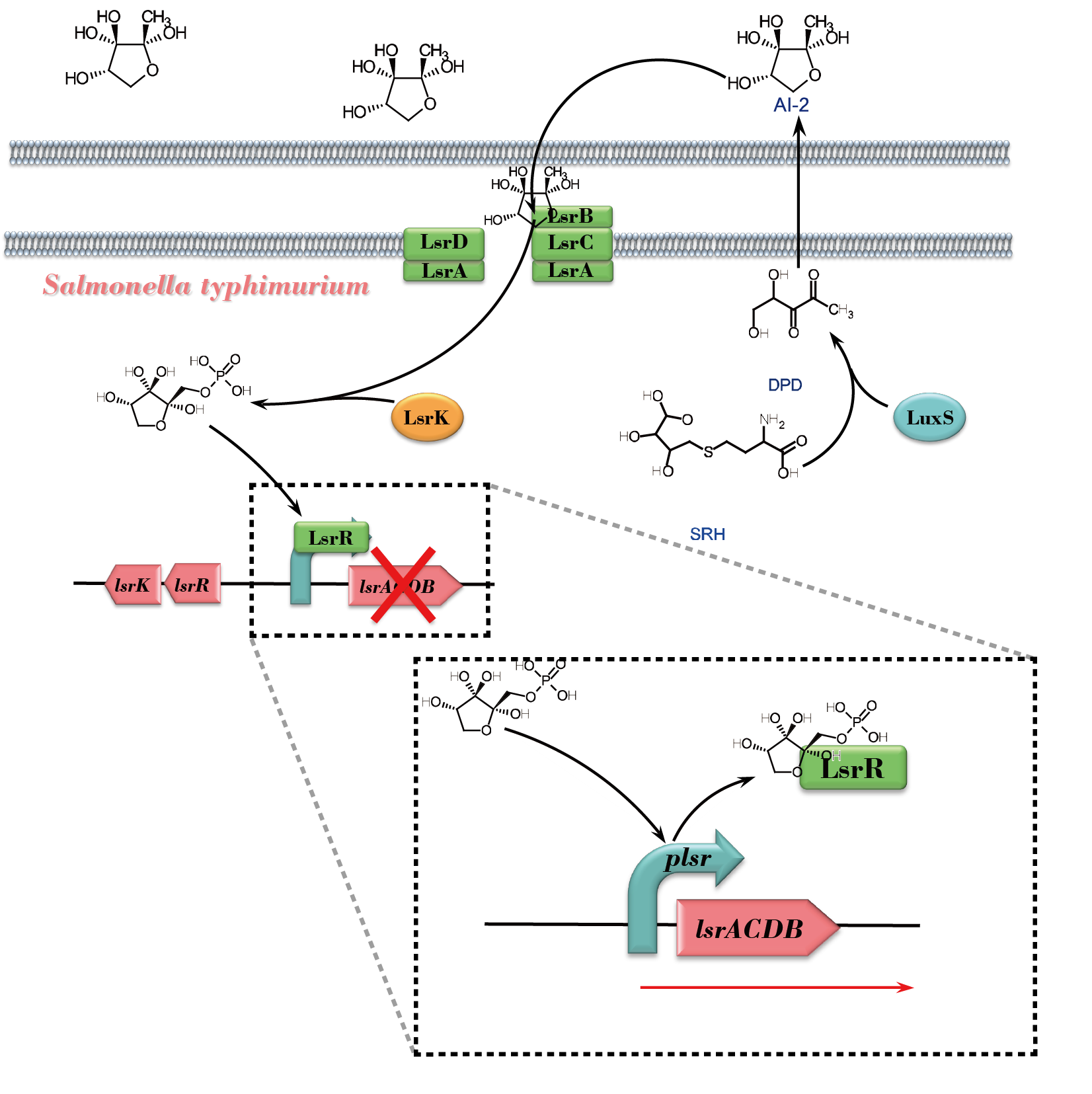Difference between revisions of "Part:BBa K1666002"
| Line 1: | Line 1: | ||
| − | |||
__NOTOC__ | __NOTOC__ | ||
<partinfo>BBa_K1666002 short</partinfo> | <partinfo>BBa_K1666002 short</partinfo> | ||
| − | Quorum sensing is a process of bacterial cell-to-cell communication involving the production and detection of extracellular signaling molecules called autoinducers. And autoinducer-2 (AI-2) has been proposed to serve as a 'universal signal' for interspecies communication. In the LuxS/AI-2 signaling system of Salmonella Typhimurium, AI-2 response involves ATP binding cassette transporter encoded by genes named Lsr (LuxS regulated). | + | Quorum sensing is a process of bacterial cell-to-cell communication involving the production and detection of extracellular signaling molecules called autoinducers. And autoinducer-2 (AI-2) has been proposed to serve as a 'universal signal' for interspecies communication. In the LuxS/AI-2 signaling system of Salmonella Typhimurium, AI-2 response involves ATP binding cassette transporter encoded by genes named Lsr (LuxS regulated). LsrC is parts of the ABC transporter complex LsrABCD, probably responsible for the translocation of the substrate across the membrane. |
| + | In our project, we set this protein-coding part under a nisA promoter and try to integrate them in the genome of Lactobacillus or Lactococcus for the final purpose of constructing an integrated AI-2 response pathway of Salmonella in the engineered bacteria. | ||
| − | |||
===Usage and Biology=== | ===Usage and Biology=== | ||
| + | AI-2 is generated by many species of Gram-negative and Gram-positive bacteria. In a group of bacteria exemplified by ''Salmonella'', AI-2 response involves ''lsr'' genes that encode ATP binding cassette-type transporter. And LsrC is part of the ABC transporter complex, probably forming the membrane channal. | ||
| + | |||
| + | [[File:NEFU_China_2015_AI-2_response_in_Salmonalla.png|550px|thumb|center|'''Fig1. Schematic overview of the AI-2 response pathway in ''Salmonella Typhimurium'''''The precursor of AI-2, 4,5-Dihydroxy-2,3-Pentanedione (DPD) , is a byproduct generated when LuxS converts S-Ribosylhomocysteine (SRH) to Homocysteine (HCY). DPD then undergoes spontaneously cyclization, forming AI-2, and exports to the culture supernatant. After that, extracellular AI-2 bounds to LsrB, following by passing the membrane channel and importing the cytoplasm. LsrK phosphorylates AI-2 afterwards. The ''lsr'' operon is repressed until phosphorylated AI-2 causes LsrR to relieve its repression on the promoter. And this allows further AI-2 import.]] | ||
| + | |||
| + | In our project, we set this protein-coding part under the regulation of a nisA promoter which can be activated by food-grade inducer, nisin. We linearized the related expression vectors and stably integrated them into the genome of the hosts. And together with other parts, we will construct a membrane channel for AI-2 generated by pathogens in the engineered bacteria. | ||
| + | |||
| + | [[File:NEFU_China_2015_pnisA_and_LsrC.png|450px|thumb|center|'''Fig2. Part of the vector containing ''lsrC'' '''We use nisA promoter to initiate the transcription of ''lsrC'' gene]] | ||
<!-- --> | <!-- --> | ||
Latest revision as of 03:20, 19 September 2015
LsrC of LuxS/AI-2 signaling pathway in Salmonalla
Quorum sensing is a process of bacterial cell-to-cell communication involving the production and detection of extracellular signaling molecules called autoinducers. And autoinducer-2 (AI-2) has been proposed to serve as a 'universal signal' for interspecies communication. In the LuxS/AI-2 signaling system of Salmonella Typhimurium, AI-2 response involves ATP binding cassette transporter encoded by genes named Lsr (LuxS regulated). LsrC is parts of the ABC transporter complex LsrABCD, probably responsible for the translocation of the substrate across the membrane. In our project, we set this protein-coding part under a nisA promoter and try to integrate them in the genome of Lactobacillus or Lactococcus for the final purpose of constructing an integrated AI-2 response pathway of Salmonella in the engineered bacteria.
Usage and Biology
AI-2 is generated by many species of Gram-negative and Gram-positive bacteria. In a group of bacteria exemplified by Salmonella, AI-2 response involves lsr genes that encode ATP binding cassette-type transporter. And LsrC is part of the ABC transporter complex, probably forming the membrane channal.

In our project, we set this protein-coding part under the regulation of a nisA promoter which can be activated by food-grade inducer, nisin. We linearized the related expression vectors and stably integrated them into the genome of the hosts. And together with other parts, we will construct a membrane channel for AI-2 generated by pathogens in the engineered bacteria.
Sequence and Features
- 10COMPATIBLE WITH RFC[10]
- 12COMPATIBLE WITH RFC[12]
- 21COMPATIBLE WITH RFC[21]
- 23COMPATIBLE WITH RFC[23]
- 25INCOMPATIBLE WITH RFC[25]Illegal NgoMIV site found at 295
- 1000COMPATIBLE WITH RFC[1000]

